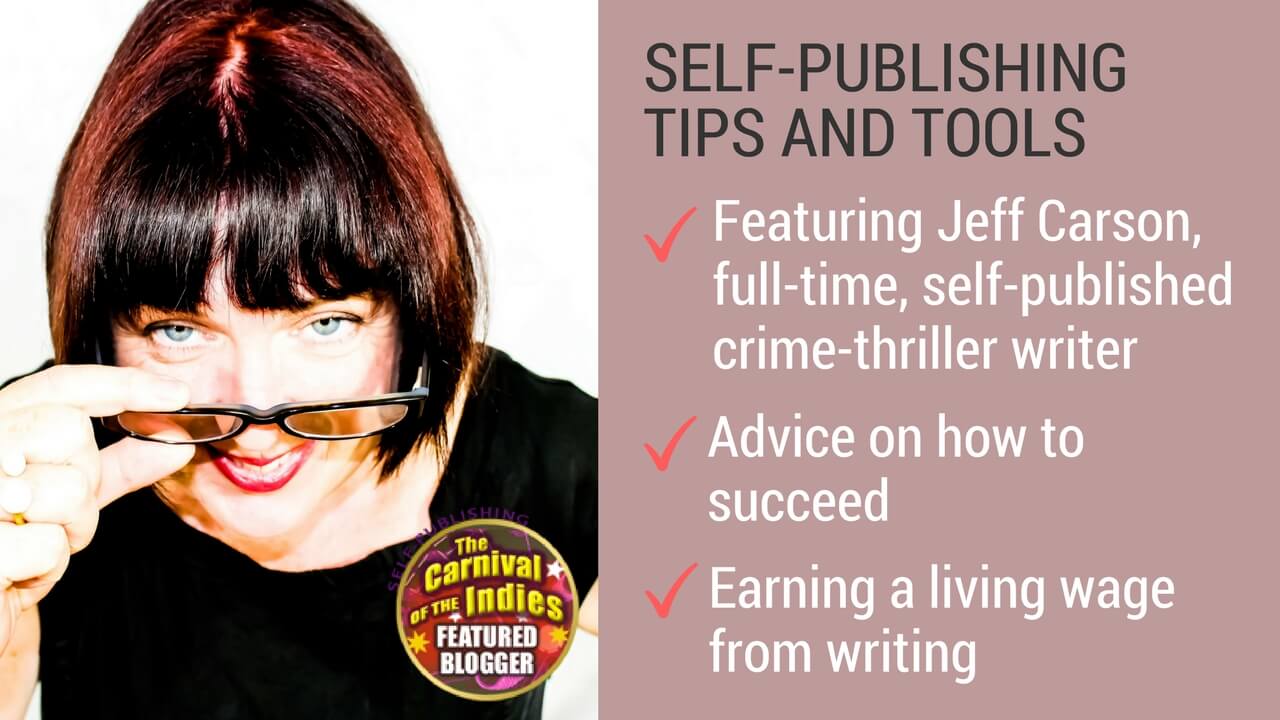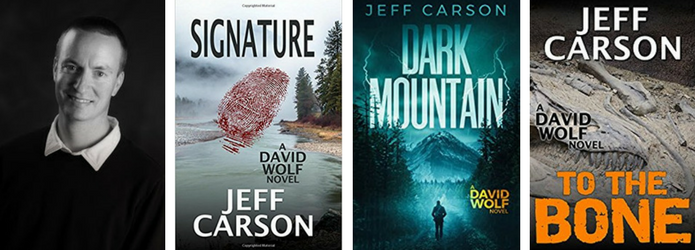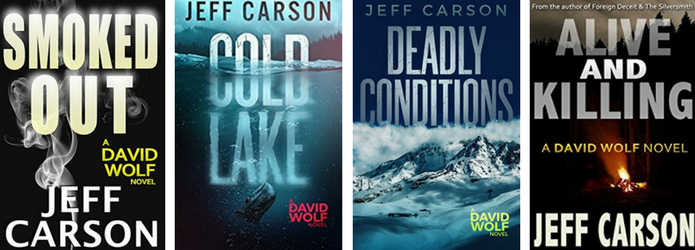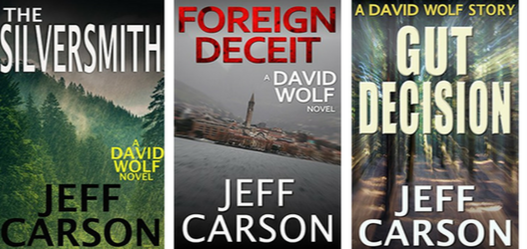|
How to make a living from self-publishing fiction This week's post is a cracker. Self-published author Jeff Carson has kindly agreed to discuss his writing journey.
This post featured in Joel Friedlander's Carnival of the Indies #81
Jeff's a mystery and thriller writer from Colorado. Writing is his full-time job and he makes a living from his self-published series.
That's a dream for millions of independent authors; below, Jeff shares 11 tips on how he turned that dream into a reality. If you're at the start of your self-publishing adventure, this is definitely for you!
My name is Jeff Carson and I’m the author of a series starring David Wolf, a cop living in the fictional town of Rocky Points in the Colorado Rockies. Right now, I’ve written ten books in the series.
When I first started out writing, I remember being tormented at night by questions swimming in my head (and by mosquitos … at the time, we were in Italy for a year, and they were thick that summer, I tell you). Questions like: Can I really do this? Can I make a living at it? Is this just a waste of my time? What if everyone hates the books?
By finding a few people online who’d made a success of becoming a self-published author, I was able to get a lot of my questions answered and some inspiration that propelled me towards making a living as a fiction writer. I despise playing the guru, and I’m cringing a little as I write this, but I have accomplished the goals I laid out five years ago. So I have to say that I feel l’ve succeeded in the self-publishing realm. There are others, many others, who would scoff at my level of accomplishment, but this blog post isn’t for them. This is for those who are in the position I once was, in that sweat-soaked Italian bed. Here are 11 things that have helped me succeed as a self-published author. 1. I want to make a living doing this That’s been the over-arching goal from the beginning. I wanted my paycheck to come from writing. I wanted to make money twenty-four hours per day from people reading my books. I’ve met many people who approach writing as a therapeutic tool for their lives. That’s fine. But 100% of people who write get the therapeutic benefit. One only makes money from it if it’s a goal. You don't wake up with a horse one day by random accident. There’s a lot of intention and action that goes into suddenly having a hay-eating animal roaming around in the back yard. Same thing goes with earning a living from writing. 2. I wrote a book series I learned that if you want to make money from writing fiction, the odds of success go up dramatically by writing a series. Since my goal was to make money with this gig, naturally I wrote a series. Harlan Coben is the exception, not the norm. On this note, I learned the hard way to not leave books ending on a cliff-hanger. I'd done this with book one and received a lot of negative reviews. I’ve since fixed the novel so that all story goals are resolved and it ends completely. In my series, my characters grow and their lives change from each book to the next, but I try to make each book a stand-alone. This helps with marketing, too, since anyone can pick up one of the David Wolf novels at any point in the series and feel grounded and up to speed. 3. I over-estimated, or realistically estimated, the level of work it would take to achieve my goal (of making a living writing) I knew that one book in a series, the first book I’d ever written and published in my entire life, would make no money. Pessimistic? It’s not. First, I was learning how to write a story. Second, I wasn’t expecting to gain a wide audience with a single book taking up a single slot in the vast Amazon universe. I knew book one was the hook – the mouth of a funnel – that would lead to the rest of the books in the series. In fact, I knew I was probably going to offer the first book for free. I needed multiple books in multiple categories grabbing people’s attention, all of them leading readers to the other books sitting in other categories. The series would act as a big net. I figured that after three books I’d be making some ‘extra money’. I hoped that after five I’d be making enough money to quit all other work and concentrate on writing only. Then I doubled that number. Therefore, I created a goal of writing ten books; then I’d judge the venture one way or another. In reality, after five books I was able to write full-time and make a full-time living wage. Now that I’m on book eleven, my goals, expectations, and earnings have elevated.
At the beginning, I felt that if I set my work expectations too low, I’d become discouraged, and fast. Because if after, say, four books I was still irrelevant and making nothing, then my hopes would be dashed.
Some people would call a ten-book ‘realistic expectation’ pessimistic, but in my mind it’s the reason I kept going when, after three books, I’d known months that wouldn’t have paid for a week’s worth of groceries. 4. I concentrate on what I want every day I’ve filled two college-ruled notebooks with lists of my goals. Every day (or most days) I open up a notebook, list the writing goals/life goals with specific deadlines, such as when I’ll finish the first draft and when I’ll publish, and then I get to work. I learned this technique by reading this Brian Tracy book on goal-setting: Goals! How to Get Everything You Want – Faster Than You Ever Thought Possible. That book definitely changed my life. I'd never even had goals before reading that book. Now I always set goals. Deadlines always get pushed back, which would be depressing if I let myself to think about it. But the system doesn’t allow for that. Each day is a new sheet, and a new list of goals with either the same deadlines or adjusted deadlines. Looking back on previous lists of goals is not permitted. 5. I read the bad reviews This is a biggie. I’ve heard some authors say, ‘I just ignore the bad reviews.’ I adopted that stance for quite a while, actually. But there’s always something to learn from a bad review. In fact, I think it’s dangerous and irresponsible if you ignore the one- and two-star shellacking some people take pride in giving out between hangover-induced trips to the bathroom, the sons of bitches. Some people get specific – ‘Nice try. A Sig Sauer P226 doesn’t have a safety! Amateur writer at best. I will not be reading another piece of filth by this author.’ So, fine. You skim past the amateur comment and go fix the book so that the special agent DOESN’T flick off the safety as she steps out of her SUV. I think my books are orders of magnitude better because of the bad reviews. I figure that if somebody came up to me on the street, pointed, laughed, and criticized my outfit, I’d shake my head and move on, not in the least worried about that person a few steps later. But if her criticism is, ‘Your fly’s down … oh, yeah, and your pants are on backwards. Idiot,’ well, then, I want to know that. 6. Screw it. I don’t need social media Early on, I adopted the stance that I needed to write my way into relevance as a writer, not tweet, post, or whatever my way into it. Once I adopted this mindset, a weight lifted off my back. I hated it for some reason. I couldn’t get a grasp on social media, so I just let go of it. My investigation leading up to my decision showed a correlation between how much an author published books and how successful they were, between how many positive reviews a book had and how successful it was. I could check an author’s success by looking at the rankings of their books on Amazon and other market places. There was no correlation, however, between how present people were on social media and their book rankings. In fact, more often than not, I saw that people who were successful had all but abandoned their social media accounts. In contrast, there were people all over Twitter and Facebook, with hundreds of thousands of friends/followers, and books lost in obscurity. Clearly there are exceptions, and some people have great success with social media, but my reasoning was: you write your way into being a writer. I rarely post on Facebook, and when I do, it’s usually a link to my new books – classic poor social media behavior. Screw it. I don’t care.
7. I am accessible
I respond to every communication sent to me. I think this is huge as a writer, or as a person in general. Nothing irks me more than somebody simply not responding to something. The most surprising thing about writing, and that I sometimes get all teary-eyed about, is the amount of love people will send your way after they’ve read your novel. People will click on the email address (which I put in the back of the book) and contact me, telling me how much they like my book. For me to not say thanks is plain psycho. Plus, it’s just good business. People who like you are more likely to share the news about your work. 8. I have a newsletter email list This is one of those things I heard people preaching – you have to have an email list of readers – but never did anything about. It took me four freaking books to finally put my email list in place. But I finally did, and that’s when I was finally able to write full time. It only took two days to write and publish a short story, which I give away on my blog as a thank-you if somebody signs up for the new-release newsletter. Now, when I have a new release, I launch the book to thousands of people, versus dropping it into a field of crickets. 9. I write in sprints first, edit later This is one of those huge game-changers for me. I was getting upset sitting in front of the computer every day but only coming out with one or two thousand words. Now, I write in sprints, which means I write in thirty-minute blocks, take a five-minute break, and then do it again. Using the backspace button is not allowed (a rule I break all the time … my OCD won’t allow David Wolf’s name to be Wols for more than a few seconds). It took me six or so books to employ the sprint tactic, and now I’ll never write any other way. 10. I have a self-editing PLAN After tapping out a real crappy draft of a terrible book, then going back through a few times, editing, ironing out inconsistencies, tightening up descriptions of dead bodies, etc., I have in the past simply read and re-read the book, then tweaked until I felt it was ‘as good as I can get it’. I’m ashamed to say, it’s only been recently that I’ve implemented a self-editing plan. The plan is something like …
11. I hire an editor who does it for a living, for a rate that allows her to do it for a living After seven books, going through three editors, and becoming frustrated with the service I was getting, I realized that I needed to hire an editor who was an editor and only an editor, and who charged a rate that clearly allowed her to feel properly compensated. The alternative is hiring somebody who does the work on the side for cheap. They’re pressed for time. They’re secretly (I imagine, because I would be) pissed off about being underpaid for a job that deserves more money. The equation adds up to a poor editing job on the finished product … suspicious stretches of pages – five, ten at a time – without a single mark on them. The saying goes, ‘You get what you pay for,’ and it can get tricky when paying for editing services. For years, I tried to get away with paying less. And I definitely got less. ... In today’s publishing environment, I know that, for me, every bit of advice helps. I hope at least one of the tips above helps you on your journey to becoming a successful self-published writer.
Where to find Jeff and his books
Louise Harnby is a fiction copyeditor and proofreader. She curates The Proofreader's Parlour and is the author of several books on business planning and marketing for editors and proofreaders.
Visit her business website at Louise Harnby | Proofreader & Copyeditor, say hello on Twitter at @LouiseHarnby, or connect via Facebook and LinkedIn. If you're an author, you might like to visit Louise’s Writing Library to access my latest self-publishing resources, all of which are free and available instantly.
12 Comments
Joanna
29/5/2017 03:38:32 pm
Thanks for that great post, Jeff. Next time, however, don't be so shy! You provide an Amazon link to Brian Tracy's book but none to your own. Admittedly, it didn't take me long to work out from Amazon that 'Foreign Deceit' was the first, but I would have been more impressed if I did not have to. I know your main aim in writing this was not to gain new readers but I cannot be the only one who, having read it, wants to join your email list. I am proof that giving good books away for free results in sales.
Reply
Louise Harnby
29/5/2017 03:44:32 pm
Hi, Joanna! Since Jeff doesn't have access to my CMS, I'll add in the links on his behalf! Thanks for the nudge!
Reply
Louise Harnby
2/6/2017 11:49:10 am
The invoice is on its way, Jeff! ;)
Reply
25/6/2017 01:07:41 pm
Hi Jeff, congrats on your success. Could you share how you managed to get thousands onto your mailing list? That would be a great help. I think most writers understand that's the ticket, but how to get those numbers is a mystery to many.
Reply
The first step was to get the system set up--which is the most important step. I remember dropping everything else for two days and writing a short story to give away on my blog if somebody signs up.
Reply
28/6/2017 07:18:48 pm
This was a useful article. I am just starting out in the world of 'self-publishing' and preparing my first release for next month. In the spirit of 'goal-setting' and Point 1 - I will see you on Amazon. :-)
Reply
Louise Harnby
28/6/2017 07:55:26 pm
Good luck with the launch, Porter!
Reply
26/10/2017 06:39:09 pm
Hi, Jeff,
Reply
Kate Minchin
7/6/2019 02:31:45 pm
Thanks for sharing Jeff, & thanks for being the conduit Louise! Both inspirational and practical, a great read.
Reply
9/6/2023 11:17:20 pm
Thank you Jeff for sharing the useful tips. As an author, it helps me a lot while publishing a book and I got so many readers.
Reply
25/8/2023 09:16:47 am
As a wannabe author, I'm grateful for this article. It has made me reconsider some of my assumptions. Thank you, Jeff!
Reply
Your comment will be posted after it is approved.
Leave a Reply. |
BLOG ALERTSIf you'd like me to email you when a new blog post is available, sign up for blog alerts!
TESTIMONIALSDare Rogers'Louise uses her expertise to hone a story until it's razor sharp, while still allowing the author’s voice to remain dominant.'Jeff Carson'I wholeheartedly recommend her services ... Just don’t hire her when I need her.'J B Turner'Sincere thanks for a beautiful and elegant piece of work. First class.'Ayshe Gemedzhy'What makes her stand out and shine is her ability to immerse herself in your story.'Salt Publishing'A million thanks – your mark-up is perfect, as always.'CATEGORIES
All
ARCHIVES
July 2024
|
|
|
|




















 RSS Feed
RSS Feed





